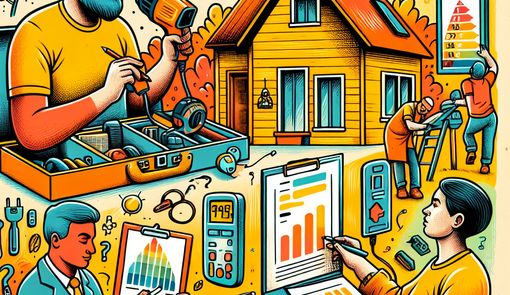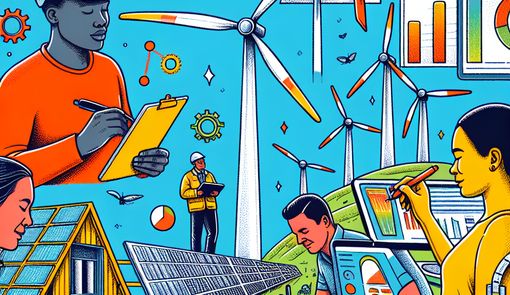Energy Auditor
An Energy Auditor performs assessments to evaluate the energy efficiency, air quality, and comfort of buildings, providing recommendations to improve energy usage.

Top Articles for Energy Auditor
Sample Job Descriptions for Energy Auditor
Below are the some sample job descriptions for the different experience levels, where you can find the summary of the role, required skills, qualifications, and responsibilities.
Junior (0-2 years of experience)
Summary of the Role
The Energy Auditor position focuses on evaluating energy consumption patterns of residential or commercial buildings and providing recommendations to improve energy efficiency. The auditor performs assessments to identify cost-effective opportunities to reduce energy usage and environmental impact.
Required Skills
- Proficiency in using energy auditing software and equipment.
- Knowledge of energy modeling and cost-benefit analysis techniques.
- Familiarity with local, state, and federal energy regulations and codes.
- Attention to detail and ability to produce accurate reports.
- Strong interpersonal skills to engage with clients effectively.
- Motivation to stay informed on the latest industry developments and a commitment to continuous learning.
Qualifications
- Degree in Engineering, Environmental Science, or a related field.
- Experience with energy auditing tools and techniques is a plus.
- Understanding of building systems, energy conservation, and renewable energy.
- Ability to interpret technical data and building plans.
- Strong analytical and problem-solving skills.
- Excellent written and verbal communication abilities.
Responsibilities
- Conduct on-site inspections to assess the energy performance of buildings.
- Analyze energy bills to establish baseline energy consumption.
- Use specialized equipment to identify areas of energy waste or inefficiency.
- Prepare energy audit reports detailing analysis, findings, and recommendations.
- Educate building owners or managers on the benefits of energy conservation measures.
- Recommend solutions to improve insulation, lighting, HVAC systems, and other energy-consuming components.
- Coordinate with utility companies to understand relevant energy incentive programs.
- Stay updated on advancements in energy-efficient technologies and industry best practices.
Intermediate (2-5 years of experience)
Summary of the Role
The Energy Auditor is responsible for evaluating the energy efficiency of residential and commercial buildings. The auditor will assess the current energy consumption, identify areas for improvement, and recommend solutions to reduce energy usage and costs, while also considering environmental impact. This role involves a mix of onsite inspections, data analysis, and client interaction.
Required Skills
- Excellent analytical and problem-solving skills.
- Strong interpersonal and communication skills, both written and verbal.
- Proficiency in data analysis and report writing.
- Ability to work independently and manage multiple projects with tight deadlines.
- Attention to detail and a high level of accuracy in work.
- Proficient with Microsoft Office Suite and energy audit-related software.
- Commitment to staying informed about advancements in the field of energy efficiency.
Qualifications
- Bachelor's degree in engineering, environmental science, or a related field.
- 2-5 years of experience in energy auditing, energy management, or a related field.
- Professional certification such as Certified Energy Auditor (CEA) or similar is highly preferred.
- Familiarity with energy modeling software and diagnostic tools.
- Strong understanding of mechanical systems and building science.
- Knowledge of local, state, and federal energy regulations and incentives.
- Valid driver's license and willingness to travel to various audit sites.
Responsibilities
- Conduct on-site energy audits to assess the energy performance of buildings and systems.
- Analyze building utility bills and energy consumption to establish baseline energy use.
- Identify and quantify cost-saving opportunities related to energy efficiency.
- Prepare detailed audit reports with recommendations for energy-saving measures.
- Educate clients on energy efficiency practices and the financial and environmental benefits of implementing recommended measures.
- Collaborate with contractors and engineers to determine the feasibility of implementing audit recommendations.
- Keep current with the latest energy-saving technologies and industry best practices.
- Assist clients with obtaining incentives or rebates for energy-saving improvements.
- Ensure compliance with all relevant regulations and standards.
Senior (5+ years of experience)
Summary of the Role
As a Senior Energy Auditor, you will be responsible for conducting thorough audits of various buildings, facilities, and systems to evaluate energy usage and identify opportunities for energy conservation and efficiency improvements. Your role will involve site visits, energy consumption analysis, and preparation of detailed audit reports with recommendations.
Required Skills
- In-depth knowledge of energy efficiency and conservation principles.
- Excellent analytical and problem-solving skills.
- Proficiency in energy modeling and analysis software.
- Ability to communicate complex information clearly in written and verbal form.
- Strong project management and leadership abilities.
- Attention to detail and a methodical approach to work.
- Ability to work independently and as part of a team.
Qualifications
- Bachelor's degree in Engineering, Energy Management, Environmental Science, or a related field.
- Certification such as Certified Energy Auditor (CEA) or similar.
- Minimum of 5 years of experience in energy auditing or energy management.
- Strong knowledge of energy systems, building science, and energy conservation techniques.
- Experience with energy modeling software and data analysis tools.
Responsibilities
- Perform comprehensive energy audits of industrial, commercial, and residential facilities.
- Analyze building utility bills and energy consumption to identify trends and potential areas for savings.
- Inspect and assess the efficiency of HVAC, lighting, and other systems to determine energy performance levels.
- Develop and present audit reports, complete with cost-benefit analysis and recommended energy conservation measures.
- Manage project timelines and coordinate with stakeholders to ensure recommendations are implemented.
- Stay updated with the latest energy-saving technologies and apply this knowledge to enhance audit quality.
- Mentor junior auditors and provide guidance on best practices in energy auditing.
See other roles in Industrial, Construction, and Energy and Energy






